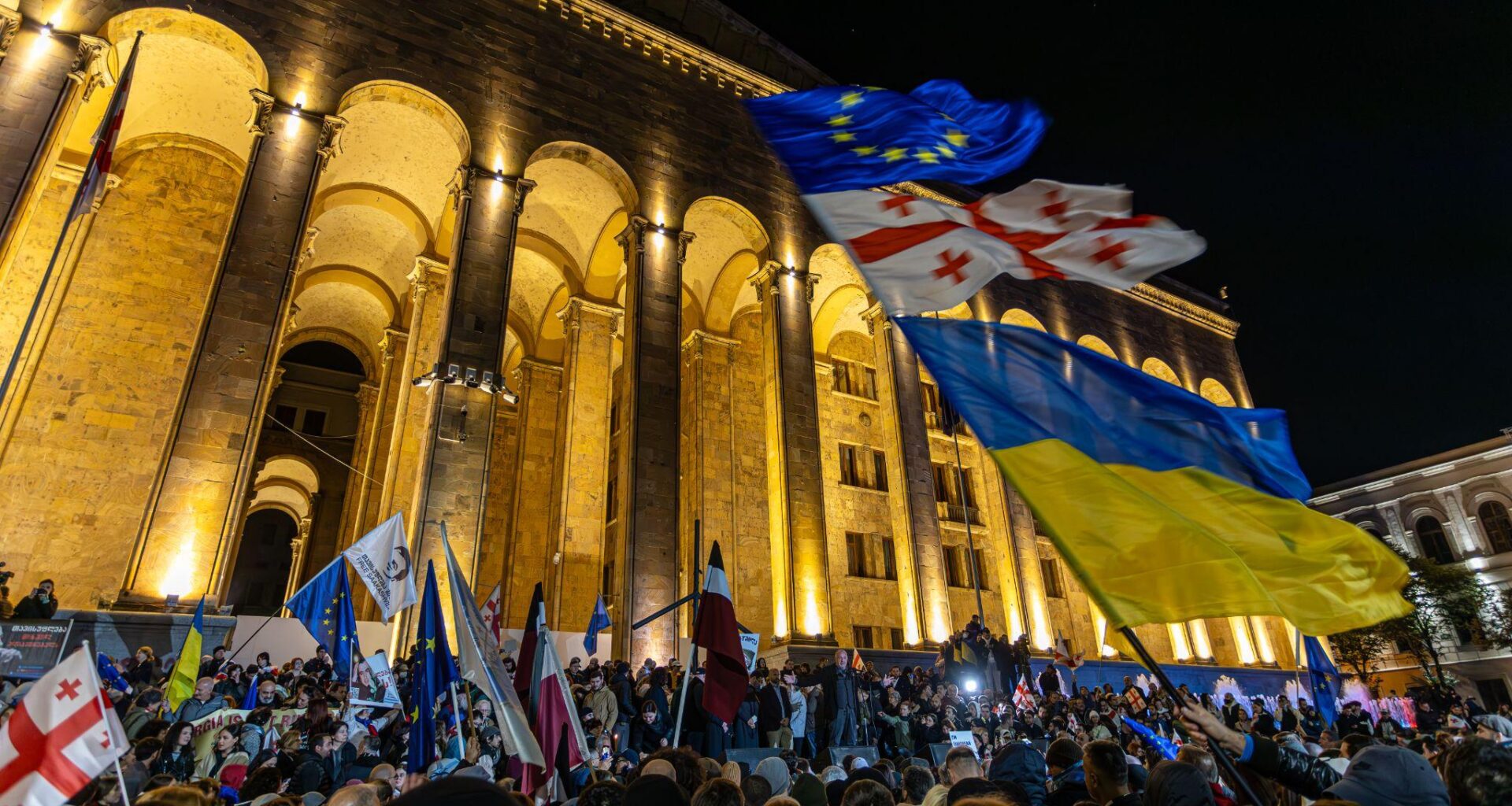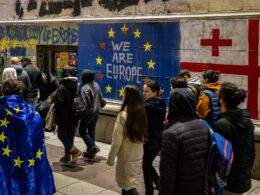In the hours leading up to the anticipated demonstration in Georgia’s capital, Tbilisi, anxiety hung in the air as the city gradually ground to a halt.
After the president fervently rallied the pro-European opposition to take to the streets, police blocked off Liberty Square, the nation’s symbolic heart of dissent.
In recent decades, this square has witnessed pivotal events shaping Georgia’s history — a mountainous republic that was among the first post-Soviet nations to break away from Russia during the 2003 pro-European Rose Revolution, which erupted in the very same place.
It also became the epicenter of the country’s second-largest protests in April 2024, ignited by the Georgian Dream party’s controversial move to adopt a Russian-inspired “foreign agents” law targeting foreign-funded organizations — widely seen as a blatant Russian-backed assault on civil society that provoked widespread outrage.
But the tension brewing in this square promises to be unlike anything the country has seen before. Crowds gathered on the streets at the call of Georgia’s ruling President Salomé Zourabichvili, who accused the country’s ruling party of rigging the elections.
Democracy’s dark day
In the 26 October parliamentary elections, the ruling pro-Russian party, Georgian Dream, secured an unexpected 54% of the votes — significantly higher than the projected 35% —amid numerous reports of electoral abuse. In contrast, the pro-European opposition managed just 37.3% of the votes, falling short of expectations for a parliamentary majority.
The following day, the country’s President Salomé Zourabichvili condemned the election results in a speech from her residence, branding them a “total falsification” and highlighting widespread violations during the voting process, including vote-buying, intimidation, ID confiscation, vote-stuffing, and carousel voting.
Special concerns surged over ballot secrecy violations tied to electronic voting machines — a critical vulnerability in the electoral system the Georgian Young Lawyers’ Association (GYLA) had raised alarms about before the election.
The statement unveiled over 1,100 complaints lodged with the Central Election Commission (CEC), indicating that 246 polling stations — potentially affecting nearly 400,000 voters — may have been directly compromised.
In response to mounting criticism over electoral abuse, Prime Minister Irakli Kobakhidze brushed off the allegations in a commentary to BBC, asserting that “irregularities happen in every country.” He insisted that any vote-counting inaccuracies were limited to “just a couple of precincts” out of Georgia’s more than 3,000 polling stations.
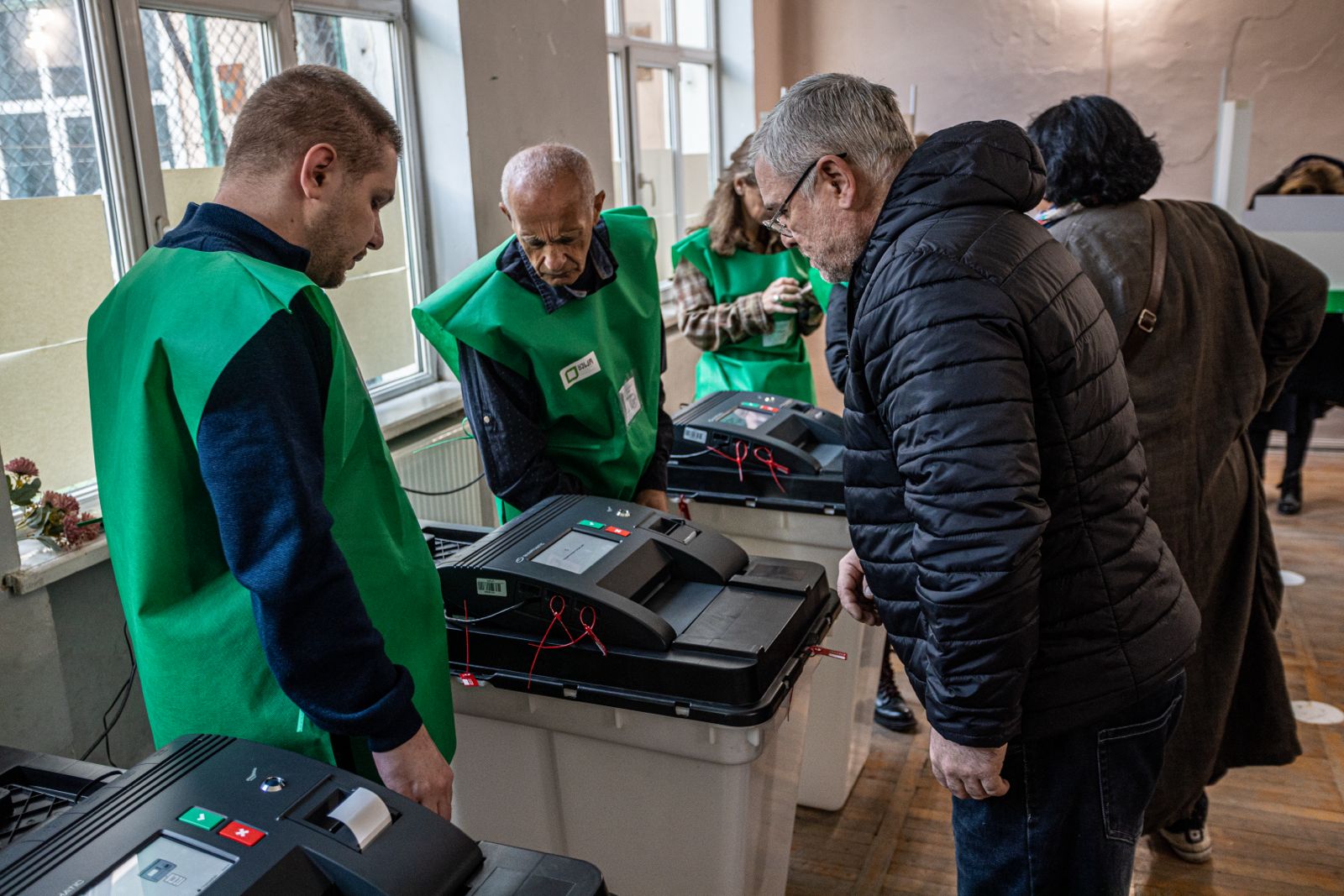
However, he seems to be a lone voice in the crowd of Georgia’s civil society.
The NGO WeVote.ge, which monitored polling stations nationwide on election day, unveiled a report detailing a troubling pattern of widespread electoral fraud during the parliamentary elections.
The organization backed its claims that the ruling party garnered an inflated vote count through tactics executed before and on polling day, drawing on 370 pieces of footage and testimonies from citizens and independent observers.
Observers noted that the Central Election Committee hastily changed the procedure for drawing lots for registrars, moving the date up by a week without public consultation. WeVote.ge also highlighted numerous instances of identity cards being renewed for double voting, alongside the ruling party’s suspicious pre-election data collection, which could be used for vote tampering.
The organization also uncovered cases of voters relying on photocopies of documents with someone else’s ID number. Additionally, reports revealed the misuse of invisible ink sprayed on voters’ palms before they entered polling stations and checked with UV light on ballots to ensure they hadn’t cast their votes already.
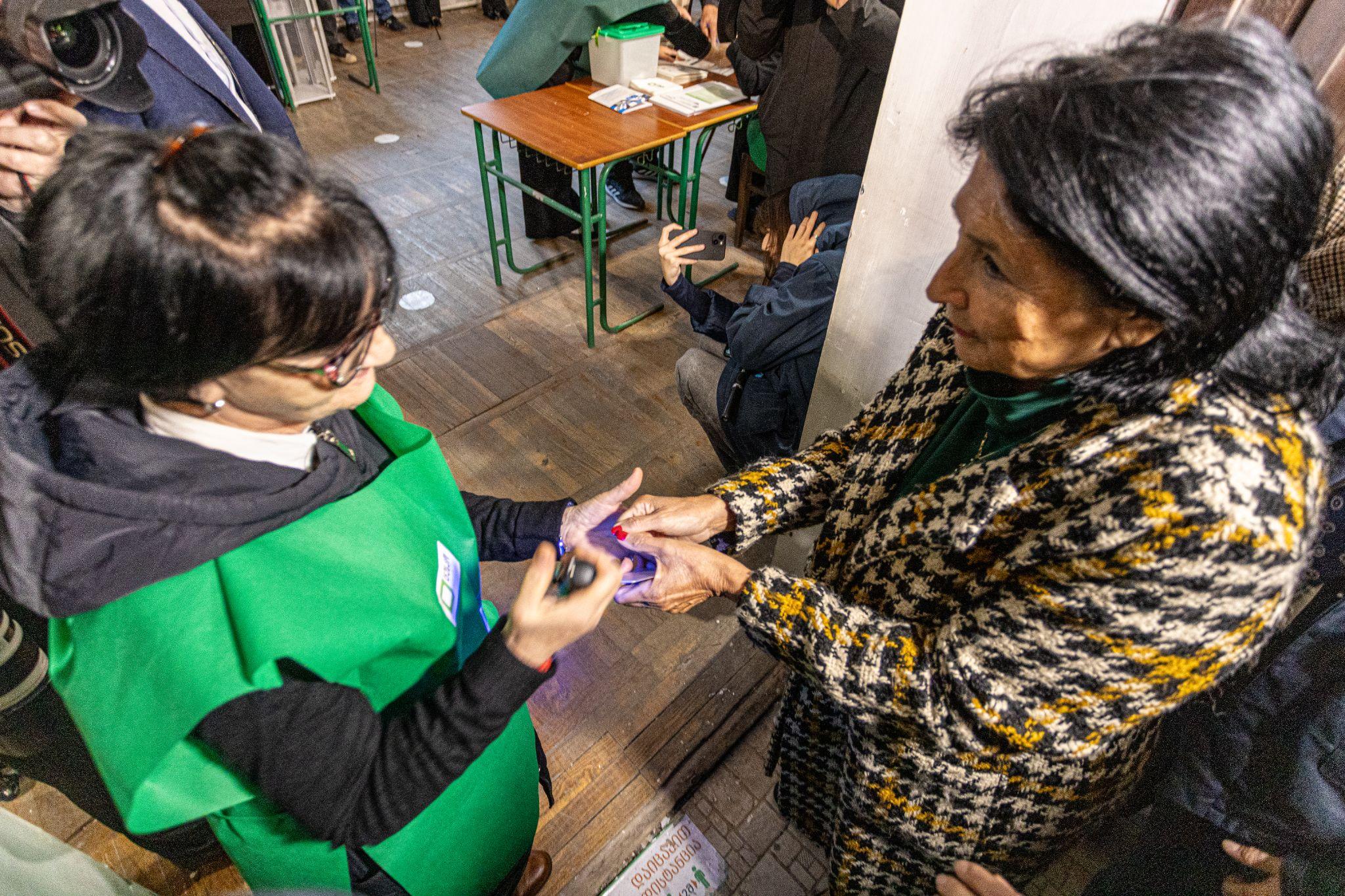
“The ink supposed to prevent multiple voting was not properly applied,” says We.Vote’s head Londa Toloraia, pointing to the poor quality of the ink and cases of tampering with the UV lamp.
A senior source from Georgia’s United National Movement (UNM), part of the opposition coalition, told Euromaidan Press that election fraud was deliberately targeted at precincts known to back opposition candidates, distorting the vote even in areas where the opposition usually holds a majority.
President cries revolt to defend Georgia’s vote
The day after the elections, President Salomé Zourabichvili, a vocal critic of the Georgian Dream party since her 2018 election, rallied the opposition’s claims and urged the nation’s civil society to flood the streets in protest against the election results.28 October
By 7 am on 28 October, crowds began to gather outside the Georgian Parliament, with social media leaks indicating that elite police units had been stationed nearby — a clear sign of the government’s anxiety over potential unrest.
Forty-five minutes later, President Salomé Zourabichvili emerged in the midst of the demonstrators, greeted by cheers.
“Your vote was stolen,” she said, urging citizens to stay united and peaceful in their protests against the declared results.
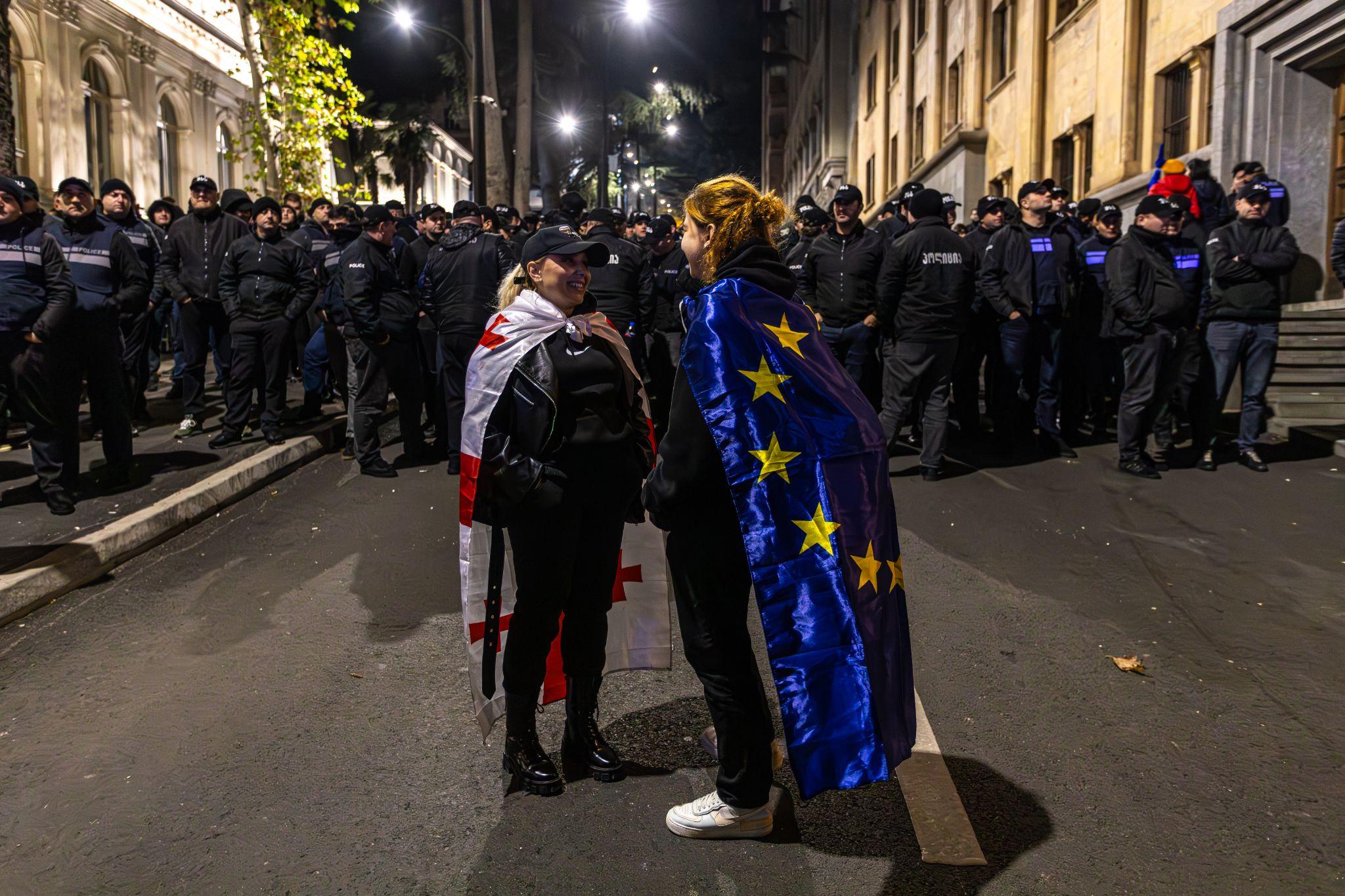
“We are united; no one will accept these unjust results,” Zourabichvili declared to the audience, calling on protesters to demand a recount of every vote cast, including those from the diaspora — votes the opposition claims were miscounted to benefit the ruling party.
“This is no time for pessimism, giving up, or surrender,” she stressed. “The results they wrote down will not be the final ones, we will achieve the truth together.”
With each speaker, the crowd’s enthusiasm surged, spurred on by calls to reject the fraudulent vote and push back against the return of Russian influence in Georgia.
As the night wore on, activists vowed to remain on the streets to demand transparency in the high-stakes election, that Zourabichvili has deemed decisive for securing the “the nation’s sovereignty and democratic future” a day prior.
Whistleblower turned target
However, Zourabichvili’s quests for a democratic future may exact a heavy toll on her own.
In her first post-election address on 27 October, the president exposed widespread violations of ballot secrecy at 2,263 polling stations, demanding the annulment of those votes.
“This is not a minor issue — it’s serious enough to call into question the entire election outcome,” she said.
In response to her allegations, Georgia’s prosecutor’s office launched an investigation into alleged election fraud at the request of the Central Election Commission (CEC), which had previously signed off the elections as free and fair despite numerous reports of irregularities.
However, the expected investigation took a U-turn, threatening to drag Georgia’s fragile democracy into a deadlock.
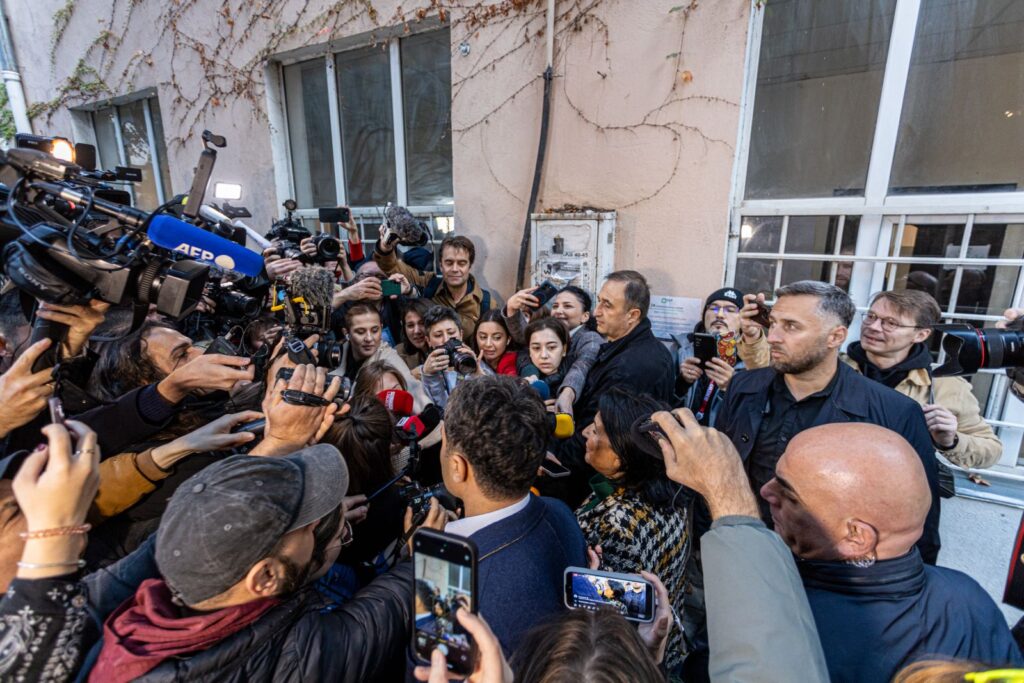
On 30 October, the prosecutor’s office called in Zourabichvili to back up her claims of election illegitimacy. The president decried it as a political witch hunt, allegedly backed by the Georgian Dream to clamp down on dissent and draw attention away from mounting evidence of electoral fraud.
“The public demands an immediate investigation from you, not my evidence, and no one expects the prosecutor’s office to start obvious political processes against the president in this situation today,” Zourabichvili stated on a press briefing later that day.
She urged the Prosecutor’s Office to focus on investigating fraud rather than “political score-settling” against her, hinting that their actions might align with Russian directives.
“This maneuver suspiciously aligns with Dmitry Medvedev’s instructions — though I can’t say who’s following them,” she said, pointing to Russia’s Deputy Chairman of the Security Council, who had called her a ‘puppet’ plotting ‘a coup’ after she spoke out about the fraud.
Russia’s dream proxy
Before thousands of protesters she rallied, Zourabichvili said Moscow had a hand in the election fraud, branding it a “Russian special operation” to destabilize the country.
The disputed victory of pro-Russian Georgian Dream – their fourth straight win since 2012 – has sparked fears of hybrid warfare from Russia, which borders Georgia to the north and controls nearly 20% of the country’s territory it occupied during the 2008 Russo-Georgian war.
Political analyst Romain Le Quiniou, director of the think tank Euro Creative, believes that the recent elections perfectly represent the broader pattern of Russian interference in key “swing states” across the region.
Since the USSR’s collapse, Russia has wielded hybrid tactics to block pro-European shifts in post-Soviet states, backing pro-Russian parties and rigging elections. This meddling sparked Ukraine’s 2004 Orange Revolution when the Kremlin-backed Viktor Yanukovych’s disputed victory triggered mass protests, forcing a re-run that handed victory to pro-EU Viktor Yushchenko.
However, Romain Le Quiniou believes Georgia’s case stands apart.
“Russia has never been as open and transparent about its manipulation of elections,” he observed.
He explains that Georgia’s case is unique, as the ruling Georgian Dream party often preempts Moscow’s interests.
“Unlike Moldova, where Russian influence is more overt, Georgian Dream aligns its policies with Russian narratives, facilitating the Kremlin’s goals.”
The overlap between Georgian Dream’s agenda and Russian interests creates a perfect opening for the Kremlin’s influence.
“The government’s alignment with Russia makes Georgia an exception, as it actively promotes policies that reflect Moscow’s interests,” Le Quiniou argues.
Since its rise to power in 2012, Georgian Dream has drifted into the Kremlin’s orbit, stalling EU accession in favour of Russian trade, proposing constitutional changes that legitimise Russia’s occupation of Georgian territories, and and sidestepping sanctions over Ukraine. Its rule is marked by crackdowns on pro-EU forces and anti-Western rhetoric to tighten its grip.
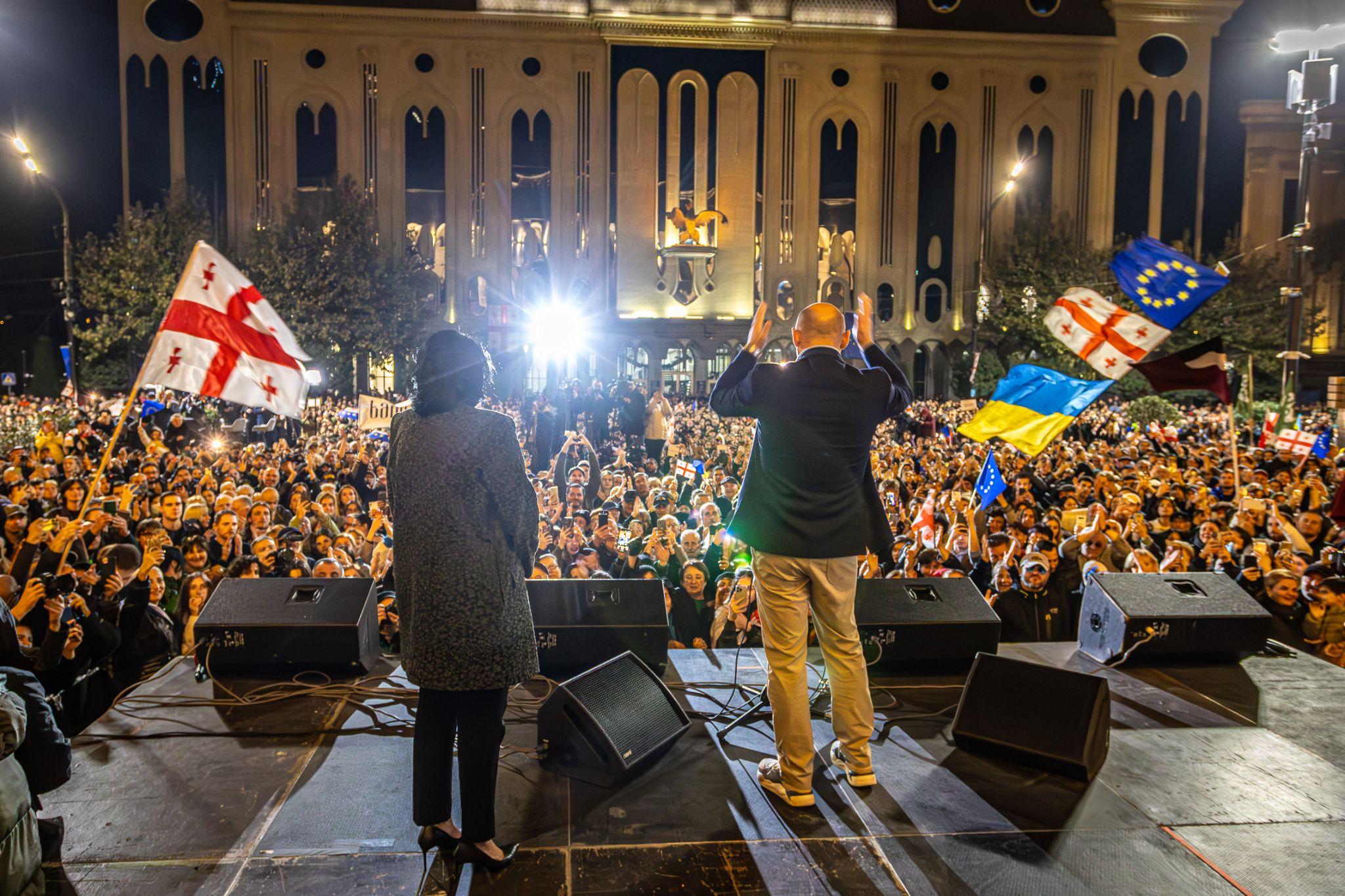
Accusations of Russian-style authoritarianism peaked after the party backed the “foreign agents” law in May 2024, forcing foreign-funded entities to register specially and igniting fears of a Kremlin-style crackdown on civil society and independent media.
However, Le Quiniou warns the party’s next term could ripple beyond Georgia, reinforcing Russia’s shaky hold on the region, which was unsettled by the Ukraine invasion and the 2023 fall of Kremlin-backed Nagorno-Karabakh, which forced Moscow to pull its troops from Azerbaijan.
Protesters, who surged to Tbilisi’s Liberty Square in response to the president’s call, share the same deep fears.
Among them is Tamari Gogoshvili, a university student who spoke with Euromaidan Press in the thick of the protest.
“If we accept this now, we will end up like Belarus, under Russia’s influence. This is the moment — we either choose Europe, or we go back to the modern USSR.”
Orbán’s Georgia gambit
As protesters sang the EU anthem, “Ode to Joy,” in front of the Parliament on Rustaveli Avenue, Hungarian Prime Minister Viktor Orbán made a surprise visit to toast the Georgian Dream’s “crushing victory.”
While many Western leaders, including those from the US and EU, expressed concerns about the election’s legitimacy, Hungary was among the few states to recognise the election results, joining Russia and Kremlin-allied Venezuela, China, Azerbaijan, and Armenia.
“While you are pursuing a pro-European policy, you have not allowed your country to become a second Ukraine,” Orbán said to Georgia’s Prime Minister Kobakhidze, urging hin to ignore the criticism.
Orbán’s visit came amid widespread criticism of his regime for strengthening authoritarian rule in Hungary and enabling Russia’s invasion of Ukraine by obstructing EU votes on crucial aid decisions and accession talks, as well as blocking the European Commission’s anti-Russian sanctions.
His trip to Tbilisi ignited a wave of criticism in Brussels, where officials have rejected the election results and demanded an investigation into potential fraud. Thirteen EU ministers denounced the trip as “premature,” asserting that he does not represent the EU’s stance, especially with Hungary holding the temporary presidency of the EU Council until year’s end.
“It’s clear that Prime Minister Orbán came to legitimise the rigged elections,” says Hungarian activist László Róbert Mézes, who spoke with Euromaidan Press during the protests.
Mézes confronted Orbán during the visit, accusing him of propping up an undemocratic process.
“I’ve never seen two political groups match like this before, not just similarities but deep alignments,” he says, comparing Orbán regime with the election-winning Georgian Dream.
“The Georgian Dream’s campaign mimics Orbán’s 2022 parliamentary election strategy: presenting opposition parties as Western-backed agents dragging the country into war with Russia, promoting LGBTQ propaganda, and forming puppet governments,” he says.
A staunch opponent of Orbán’s regime, László has no doubts about what the Georgian Dream’s new term in office might entail:
“Russia’s gravitational pull is hard to resist for those open to autocratic tendencies. Putin’s regime serves as the perfect model. Putin represents a political example for Orbán or the Georgian Dream.”
Related:
• Georgia teeters on edge as pro-Russia party claims disputed win
• The global implications of Georgia’s political crisis
• Georgia’s Foreign Agents law: Russia’s new frontline in its war against freedom in the world
•“Story of a dying empire”: Georgia’s “foreign agent” law protests echo Ukraine’s Euromaidan




